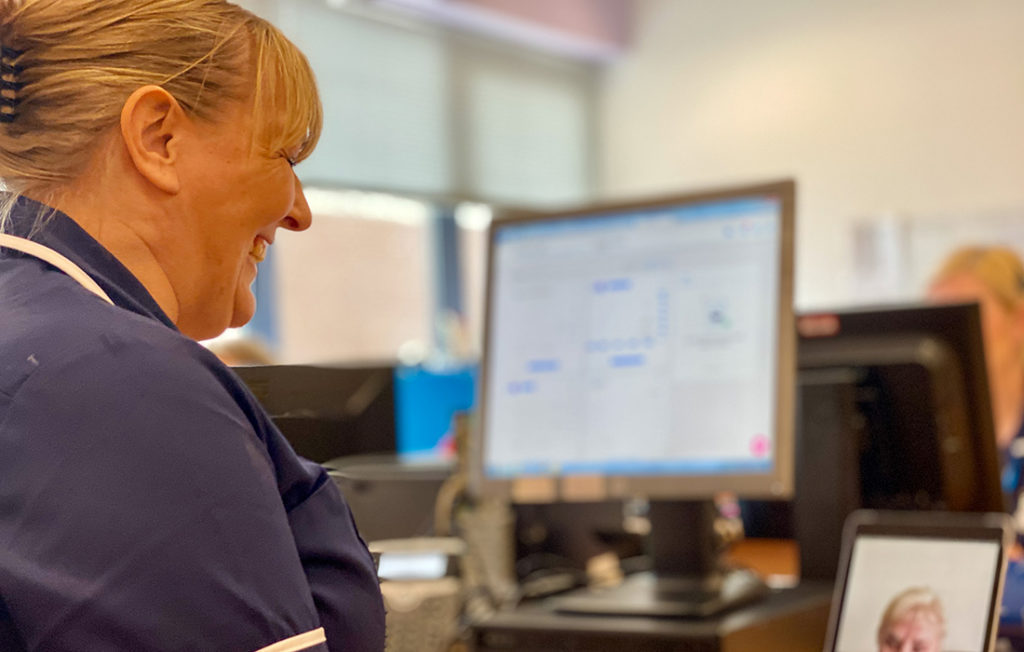Short of breath? 7 ways tech can help

By Lisa Kempster
Lisa kempster is a nurse practitioner at South Tyneside and Sunderland NHS Foundation Trust, and here she shares her suggestions on how tech can help with those living with breathing difficulties…
The last six months has been a scary time for anyone with breathing difficulties. Covid-19 poses a very real risk to people with asthma, COPD and other lung conditions. But for those individuals who are often wheezy or short of breath, the pandemic has presented a whole host of other issues such as social isolation, anxiety and loss of fitness.
As a nurse practitioner working in South Tyneside and Sunderland NHS Foundation Trust, I see this every week. Take someone with asthma who might be anxious about having a flare up. They don’t want to exert themselves, so walking around the block or in the garden becomes a thing of the past. Their muscles get weaker and need extra oxygen for the slightest movement and they feel more breathless.
Leaving the house becomes a big deal; they see friends and family less and feelings of loneliness start to creep in. This can lead to an increased risk of anxiety and depression.
Over the last few months, I’ve been supporting people with respiratory conditions to break this cycle. Technology has played a central role, with many of my patients using apps, tablets, GPS devices and talking calendars to stay active, socially connected and in control of their breathing. I asked national body, the TEC Services Association (TSA) about everyday devices for people with breathing difficulties that can make a real difference to their quality of life and day-to-day independence. Here are some of their suggestions:
1. Get tracking
Many people now use apps on a smartphone or tablet to monitor their breathing condition at home. Luscii is one example that is being used by healthcare professionals in Sunderland to help track patients’ blood pressure, oxygen levels and temperature, sending readings to medics. The app is prescribed by a GP or community healthcare team, and can be used to video call nurses if you feel unwell, so they can help before your breathing gets worse.
2. Stay in control
Apps such as myAsthma and myCOPD put power back into the hands of people with breathing difficulties. Easy-to-follow videos help you perfect your inhaler technique and tips from experts advise on how to manage your condition. You can even do online rehab classes from the comfort of your home.
3. Set a reminder
Forgetting to take your meds at the right time can cause a breathing flare-up. Devices such as the YourMinder talking reminder clock play messages so you remember to take your pills. The YOURmeds tag clips to your pack and alerts you when it’s time to take your medication. Smart speakers like Apple HomePod, Amazon Echo and Google Home can be programmed to remind you about your meds. Your local council might be able to help too. Many local telecare services offer systems such as a Tunstall Lifeline unit which can give automated meds reminders when you need them.
4. Order online
Running out of medication is easily done. With Covid-19, people are now requesting repeat prescriptions online and there are lots of ways to do this with your own GP surgery. Download the NHS app or click on the NHS website repeat prescription ordering service. Some pharmacies also have their own apps and websites where you can order repeats, including Boots, Echo (by Lloyds Pharmacy) or Pharmacy2U.
5. Keep connected
Digital tablets such as Ethel Care and KOMP have large buttons and easy displays that help people to stay in touch with their family, shop online or play digital brain puzzles. Don’t forget that chat apps like Zoom, Facetime and WhatsApp use your internet connection to video call friends and family meaning you keep your phone bills down.
6. Go out and about
Devices like Careline Care’s GPS Watch can be worn on your wrist and the GPS SmartSole in your shoe. When you go out, they send an alert with your location, giving you and your family peace of mind. The same goes for alarms like acticheck’s Assure wristband which works at home, in your garden and beyond and can send out an SOS alert to your loved ones if you have a breathing flare-up.
7. Be mindful
Anxiety is a big problem for people with lung conditions. If you’re struggling to breathe you can easily become worried, stressed and frightened and this can make it harder to catch your breath. The NHS app library is a great resource for mental health and mindfulness apps such as Beat Panic, Chill Panda and Thrive which teach breathing techniques and tips to relax your body and mind.
Lisa Kempster works as a nurse practitioner for South Tyneside and Sunderland NHS Foundation Trust and leads the Recovery at Home Service, which delivers rapid treatment to patients in their own home.
To find out about local TEC services that can help with a range of health conditions and can support you to live independently for longer, visit TSA, the TEC Services Association: https://www.tsa-voice.org.uk/support-at-home





